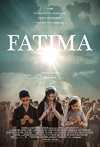Professor Nichols (Harvey Keitel), writing a book about apparitions, opens Fatima, gently conducting a rare interview with Sister Lucia (Sonia Braga) over 70 years after she experienced visitations from the Virgin Mary. She shares with quiet wisdom her story.
No one longs for peace more greatly than the participants of war. In 1917, during WWI, in the small rural town of Fatima, Portugal, the Angel of Peace (Ivone Fernandes Jesus), not to be confused with the Virgin Mary apparitions, appeared to Lucia Santos (Stephanie Gil), then a young shepherd girl. During the next few months, she would appear to Lucia infrequently, giving her peace in times of great struggle. It was during this time of war that we find Lucia and her strict but loving Catholic mother, Maria (Lucia Moniz) in an agonizing, prayerful wait as Mayor Artur (Goran Visnjic) reads aloud the names of the town’s young men, either deceased or missing. Thankfully, this week, Manuel, Maria’s son’s name, is not read. Maria reminds Lucia she must pray and atone for her sins in order to bring Manuel home safely. More than anything, Lucia’s family and the townspeople want peace, an end to the deaths of their sons.
But there is respite for Lucia and two younger friends, Jacinta (Alejandra Howard) and Francisco (Jorge Lamelas), enjoying the bucolic peace of the farm as they watch over the sheep herd. One afternoon, Lucia leads the children in a prayer for peace, when they are visited by a beautiful lady in translucent white, speaking softly to the awestruck three. She identifies herself as being from heaven and advises the children they must “pray the rosary every day to bring peace to the world and to end the war.” Further, she advises Lucia, “Jesus has chosen you. You are going to be the messenger of faith in Mary’s Immaculate Heart.” She tells them they must return to the same place, at the same time each month, for six months.
Word travels quickly in the countryside of Portugal. Not all are pleased. Lucia is attacked by skeptics, Artur admonishes Maria for the disruption her daughter is causing and the family suffers humiliation. Nevertheless, Lucia, Jacinta and Francisco hold steady, defending their experience with the Lady. In the Santos home, the family questions Lucia’s mental stability, blaming her for creating trouble. Only her strong father Antonio (Marco D’Almeida) takes her aside noting her special gifts, promising his unconditional love.
During her next appearance, the Lady lovingly commands Lucia, “You must pray often and suffer greatly. Sacrifice yourself for sinners.” She reveals to the children four small daggers in her heart, sliding blood drops onto her white linen robe and then to the ground. So Lucia has a mentor in suffering. And suffer she does. The frightful Bishop travels from Lisbon to interrogate the detained children, certain they are lying as he sees no extraordinary value in them. Many people, carrying pictures of lost or sick loved ones and filled with a hope they desperately need, crowd the church, choking the streets. Finally, Artur overrides Father Ferreira (Joaquim de Almeida) and closes the church because of the chaos, blaming Lucia all the time. But when a child psychologist confirms their mental health, he is forced to let the children go.
On Oct. 13, 1917, the three children and 70,000 onlookers wait for the Lady. It has been raining heavily, but at the designated time, it clears and sunlight ushers her in. She confirms to the children she is The Lady of the Rosary. Referring to the crowd, “I will lead them to my Son through peace and love.” Jacinta and Lucia give the crowd her messages since only they can hear her. The crowd is humbled and reverent, yet the children ask for a miracle to prove her presence. What is now termed “The Miracle of the Sun” begins, the sun seeming to dance and rotate above the horizon for the masses to see.
Fatima is a convincing story of religious apparitions. While many question the origin of the apparitions, many hold fast to Lucia’s testimony. Father Ferreira prematurely suggested the possibility the visitations could be evil, appearing as an angel of light. Certainly, the truth claims of the Lady were unknown to the basic essentials of the historic Christian faith. Neither the apostles, nor Christ observed postmortem Mary leading any person to Him. In the Book of John, Jesus speaks of all whom the Father has given Him (John 17:2-4). But Maryology is an ingrained discipline in itself and this film revolves around the apparition aspect of the Virgin Mary.
Production-wise, the film excels with cinematography that communicates with a fluid, personal language of close-ups and varying perspectives. The film is intentionally cut with longer scenes to preserve the feel of a 1917 countryside life, and to undergird a message of prayer for peace. No CGI or fast action here. Writing, directing and acting come together very effectively to create a fully engaging cinematic experience. Of note are the stirring performances of Lucia Moniz, Stephanie Gil, Goran Visnjic, Marco D’Almeida and Sonia Bragg. The film can be an opportunity for families to discuss the doctrinal origins and differences between Protestantism and Catholicism. There are a couple of mild war scenes and a nebulous Hell scene which involves shooting the Pope and others to death at close range. This could be disturbing for very young ones, therefore Dove awards Fatima the Seal of Approval for Ages 12+.
The Dove Take:
Fatima is a powerful and beautifully produced Catholic film that investigates and relives apparitions of the Virgin Mary, seen by three shepherd children in Fatima, Portugal in 1917. The permeating message of peace is central and drives the reason for believing.





